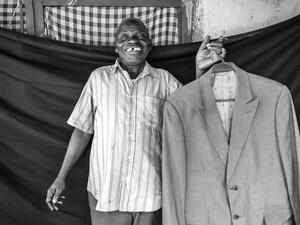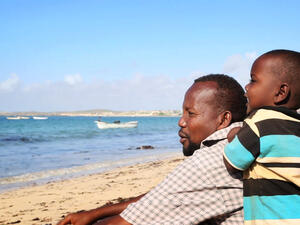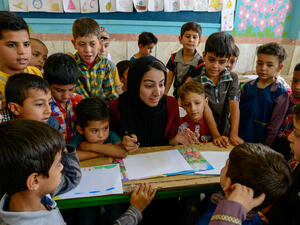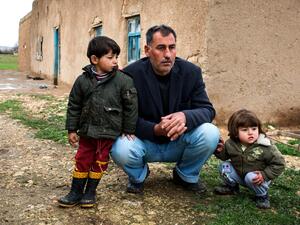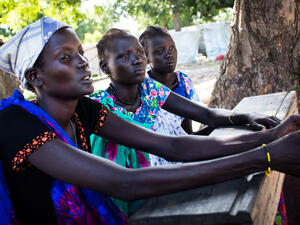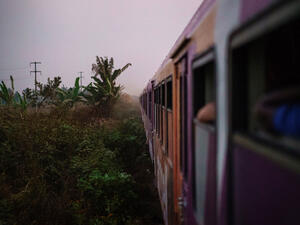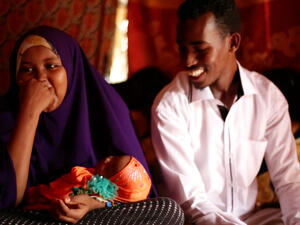Almost 120 displaced people return to Mitrovica's Roma Mahala district
Almost 120 displaced people return to Mitrovica's Roma Mahala district

Members of the Roma, Ashkalia and Egyptian communities offload belongings from a UNHCR truck in front of the new apartment blocks in Mitrovica where they will live.
MITROVICA, Kosovo, March 12 (UNHCR) - The UN refugee agency has helped 118 people from minority communities return to their home district in the Kosovo city of Mitrovica almost eight years after they were forced to leave.
Last Wednesday, 19 families comprising 118 people moved into new apartment blocks in the Roma Mahala district of south Mitrovica. Most had been living in temporary shelters set up by UNHCR in north Mitrovica and other areas of the United Nations-administered Serbian province of Kosovo. A group of three families comprising 23 people came back from Montenegro.
The returnees, all members of the Roma, Ashkalia and Egyptian (RAE) communities, were among an estimated 8,000 residents of the Roma Mahala district forced to flee their homes almost empty-handed in late 1999 amid ethnic tensions.
A total of 36 housing units for almost 60 families were built on public land under the Roma Mahala Return Project, which is being coordinated by the municipal authorities in cooperation with UNHCR and other partners such as the Organisation for Security and Cooperation in Europe (OSCE), the United Nations Mission in Kosovo (UNMIK) and the Danish Refugee Council.
"This is the most successful and largest RAE community urban return in the area, and I could say in the region. It took a lot of effort to come to this day, to work with the municipality, OSCE and UNMIK in getting donors' attention for this programme," said Sunil Bahadur Thapa, head of the UNHCR office in Mitrovica. "At the same time we were also doing confidence-building measures for the returnees living in camps in the north."
The returnees said they did not see security as a major issue in the Roma Mahala, adding that they believed Roma, Ashkalia and Egyptian communities in Kosovo were no longer under threat. But UN security forces and the local police patrol the area regularly.
"I have no complaints. I have almost forgotten our hardships. We lived with poverty, but we did receive food and hygiene packets," said Mejreme*, a young mother of four who spent eight years with her family in a grim settlement in Leposavic, the northernmost municipality of Kosovo. "We are happy that we came back. There are enough rooms now for our family," she added.
Hasan*, a 38-year-old father of nine, was happy to leave camp life even though he has no job. "They were awful conditions as we had only one room where we lived together, eleven members. I came back to the place where my grandfather used to live, and I am only hoping for a safe life here," he said.
The freshly painted apartment blocks and neat flats were a welcome sight for all the new occupants, who arrived in Roma Mahala aboard UNHCR trucks. "We moved from one place to another; first in the Kabllare camp and then to Osterode. We had a hard life away from our home," said Ibrahim*.
During the March-June 1999 conflict in Kosovo, more than 900,000 ethnic Albanians were forced to flee Kosovo. They returned when NATO troops entered Kosovo - the exodus of some 200,000 Serbs, Roma, Ashkalia, Egyptians and other minorities began within days. Some 16,000 of them have since returned to their homes in Kosovo, according to UNHCR estimates.
The Ibar River running through Mitrovica has since 1999 become a symbol of Kosovo's division, with ethnic Albanians living in the south of the city and Serbs concentrated in the north. UNHCR estimates that there are some 21,000 people belonging to all communities displaced within Kosovo.
* These names have been changed for protection reasons
By Myrna Flood and Shpend Halili in Mitrovica, Kosovo


